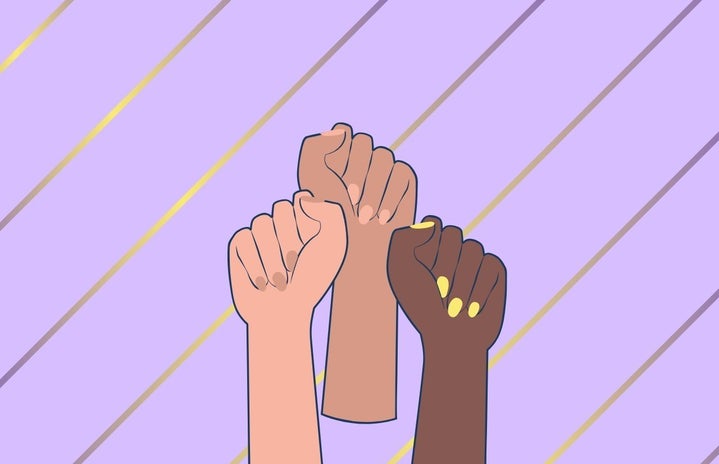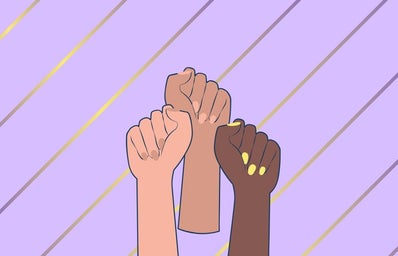In today’s climate, it’s really important that we stick together as a community and learn how to build each other up. In light of recent events, you may be wondering: “how can I best support my friends and family or loved ones without undermining their experiences or rights?”
It’s important to remember that if you don’t fit into a marginalized group, you have some sort of privilege that another community may not. You may be able bodied, cisgender or not a member of a racialized group. Once you recognize that privilege, you may start to wonder what your place within this community is and how you can uplift those that do belong to these marginalized groups. Here are some tips that may help you based on my personal experience. While these tips may be helpful for some, always remember that everyone is different and what they require or need out of a friend or an ally could look differently than what I’m about to describe.
Listening
In order to support those we care about, it’s important that we listen to and validate their stories and experiences. Their experience is unique to them, and it’s important for you to recognize this by appreciating their stories for what they are and how they describe them to you.
Avoid Tone Policing
When your loved one is sharing their experiences or struggles with facing discrimination, it’s helpful to understand that this is a lived experience and it can be difficult to separate emotions from storytelling. When someone is expressing to you their concern, grief or sorrow and you tell them that they are overreacting, or that the situation is not how they have perceived it, you are telling them that their feelings from that situation is not valid. This is a micro-aggression, and it might make them feel as though they cannot trust you with their thoughts, feelings and experiences.
Educate Yourself
If you want to be a supportive ally, it’s important to know what you are talking about. It’s difficult to bring awareness to things that you have little to no idea about. While your loved ones can help you with understanding their history and struggles, it’s up to you to learn more about their history and their fight. For people in marginalized groups to continuously be explaining their stories or experiences in an attempt to raise awareness, it is typically not an easy experience for them. While they are explaining to you why you should care or what happened, they’re reliving traumatic, real-life experiences. This takes a huge toll on mental health and can become emotional labour for them. Try to understand why certain things such as cultural appropriation or certain words may be derogatory or offensive. If one member of that society has approached you and said, “please don’t use that phrase or please don’t do that,” then it’s up to you to understand and educate yourself as to why they may have approached you and told you to avoid those things.
It’s Okay to Be Wrong
In order to be a supportive ally, it’s crucial that you understand that it’s okay to be wrong about things. An important part of learning is understanding what is right and challenging your preconceptions. You are showing growth and development when you come to terms with the fact that history as you knew it may not have been the most accurate or BIPOC and LGBTQ+ conscious.
Use Your Privilege
Jane Fonda, a previous member of the activist group, the Black Panther Party, is an extraordinary example of how you should be using your privilege. She actively uses her privilege as a famous, white actor to protest for causes such as environmental and social justice. Similar to other BIPOC activists, Jane Fonda recounts her experiences with the criminal justice system and how it treats people of different backgrounds in the United States of America. While you don’t have to be actively getting yourself arrested to make a statement, you could use your voice to educate those around you. If you have access to technology and Wi-Fi, you could use your privilege to sign petitions and write letters to members of Parliament and actors in society that are capable of making a change.
Vote and Be Politically Aware
Voting is an important part of being a good citizen and a member of the community. By understanding the importance of voting and the importance of choosing a political party this not only serves a purpose for you, but for the community that you want to see. You are showing those in the community that you see their struggles and you want a system that helps them as well as you.
Getting involved in politics may seem like a daunting task, but all it takes is a quick Google search to look up different parties and their platforms. A simple 30-minute dedication to understanding different contenders during an election can really go a long way in terms of your involvement in politics.
Talk
As simple as it may sound it’s important that you talk about things that are going on in society. If you hear someone use a racial slur or a derogatory term, talk to them. Call people out on their actions and hold each other accountable. A community or society is a team, and if teams aren’t playing together, they won’t succeed.
Someone’s right to a free and happy life is not political. No one should have to fight in order to be treated like a human being. As an ally, you are helping those around you obtain those rights, amplifying their voices and helping them in their fight for equality and/or equity – where they apply.
Sources



